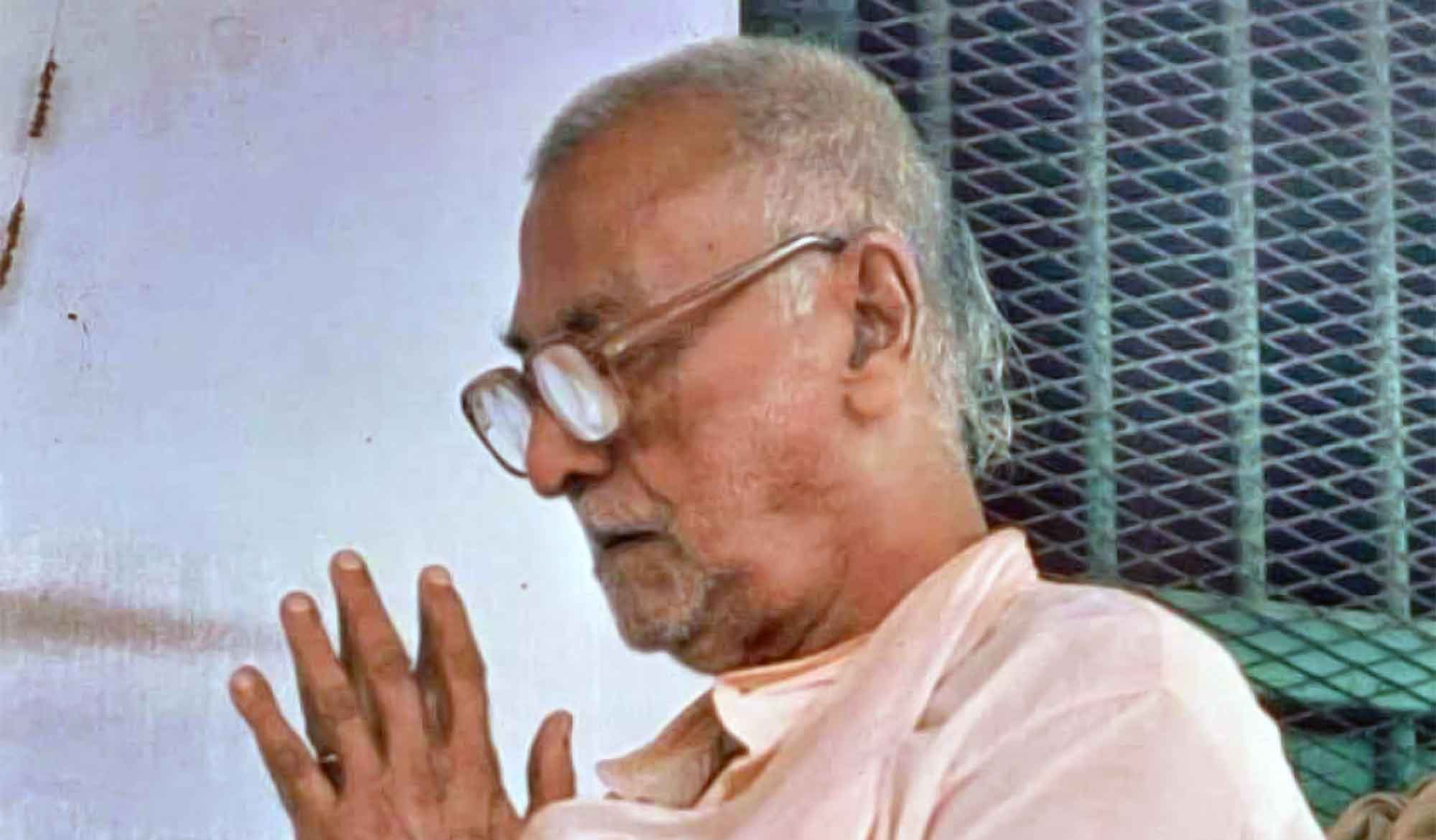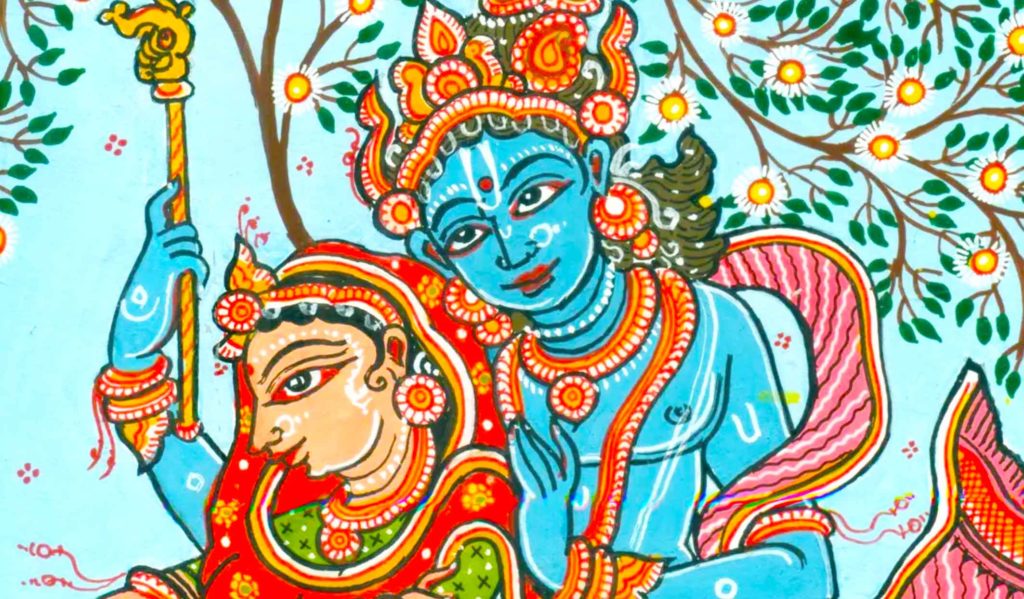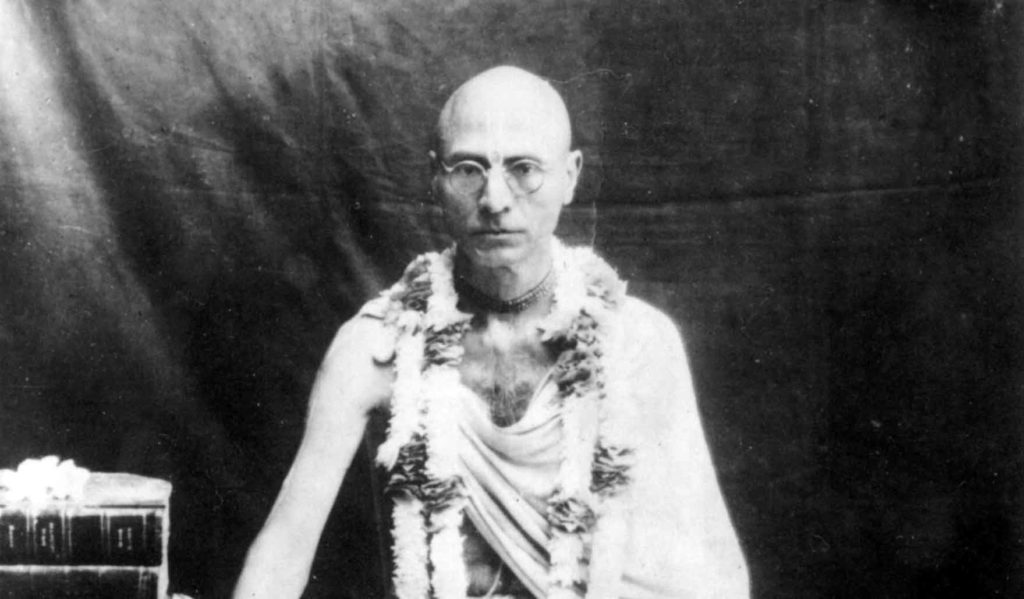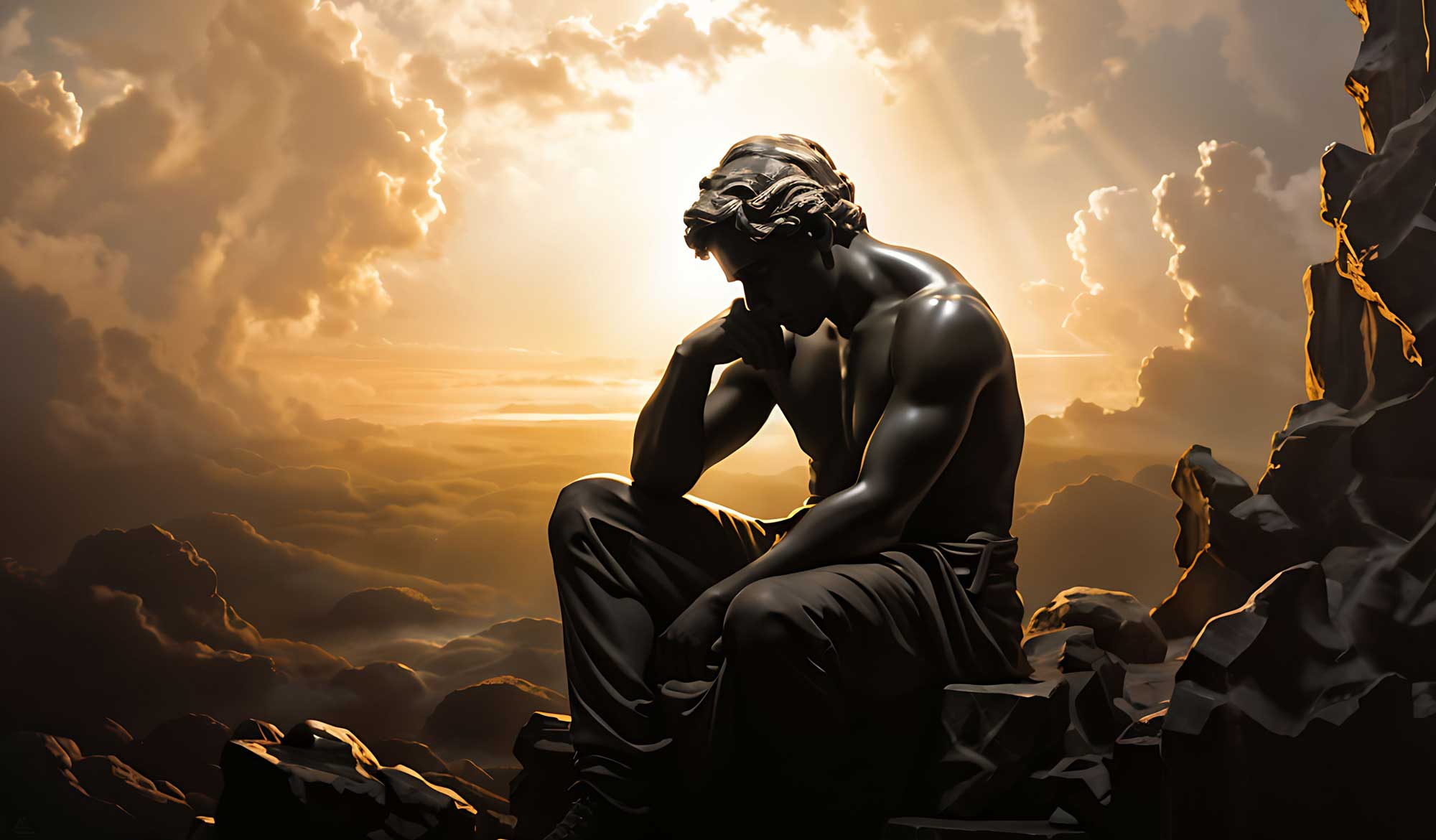Overview
The following has recently been transcribed from a recording of the first meeting between Śrīla Śrīdhara Mahārāja and Jagat Guru Swami (Swami B.G. Narasingha Mahārāja) on February 26th 1981.Members of the Bhaktivedanta Institute were also present. In this talk, Śrīla Śrīdhara Mahārāja discusses the origin of the jīvātmā and the utter futility of trying to understand everything about the Supreme.
Bhakti Svarūpa Dāmodara Svāmī: Dhira-Krsna Mahārāja (Bhakti Sudhīra Gosvāmī) is here, Jagat-Guru Mahārāja (Swami B.G. Narasiṅgha) is here from Vṛndāvana, and we have some students from the Bhaktivedānta Institute who would like to have your darśana, Mahārāja.
Śrīla Śrīdhara Mahārāja: All are welcome.
Bhakti Svarūpa Dāmodara Svāmī: One of the points I have been seeking regarding our book is somehow the jīva is forced to stay within the temporary physical body –
Śrīla Śrīdhara Mahārāja: He is not forced. The first starting point is that of free will. We have to accept that and we have to find that out. Otherwise God will be responsible for the jīva’s misery.
na kartṛtvaṁ na karmāṇi lokasya sṛjati prabhuḥ
na karma-phala-saṁyogaṁ svabhāvas tu pravartate
“The Absolute Truth does not create anyone’s sense of proprietorship, one’s actions or the result of those actions. All this is enacted by the modes of material nature.” (Gītā 5.14)
“I am not responsible for the suffering of the jīva. I am aloof. I am left with freedom and freedom is their intrinsic qualification.” Whatever is conscious, that is free. It depends on the magnitude. Anu-caitanya (minute consciousness) – freedom is also anu. The jīva is vulnerable and by a trace of their imperfect freedom they come to the world and nothing forces them. Then, when the jīva comes in cooperation with Māyā, the force of māyā is applied first. First is free will, and then Māyā’s grasp takes him. In this way transaction with this world begins and not by the interference of the Supreme. It is by the small free will of the anu-caitanya, the defective consciousness. There are many –some coming this side, some coming that side from the marginal plane.
Bhakti Svarūpa Dāmodara Svāmī: So at what point does the jīvātmā begin to recognise his use of free will in a very negative sense?
Śrīla Śrīdhara Mahārāja: The possibility is there in the taṭasthā. There is possibility of positive participation and possibility of negative participation is also there. These two functions are in germinal form when he is in the marginal plane. There is possibility of negative and positive. By free choice – that one side, one possibility, he is given recognition and it starts. The journey begins. Then by the handling of the sadhus, of the divine agents, that can be modified when wandering in the world. When the positive aspect awakens, then that gives the jīva a chance to go towards the divine realm.
Bhakti Svarūpa Dāmodara Svāmī: That is also dependent on free will?
Śrīla Śrīdhara Mahārāja: Yes, free will is there. Consciousness means to be endowed with free will. All atoms of consciousness are endowed with free will. Without free will consciousness may not be complete and then it is matter, material existence. Conscious spirit means to be endowed with free will.
Generally when the jīva is here, independent of his free will, the divine agent can help him. That is sukṛti. The first stage is ajñāta-sukṛti – unknowing acquisition of the favour of the Lord through the sādhus. Just as when a patient is unconscious – the doctor may give an injection perhaps, then later the patient regains consciousness, cooperation begins and the treatment goes on. But when he’s unconscious, even at that point treatment is possible. So when the jīva becomes engrossed in material consciousness, the divine agents come and utilise his energy in some way for the Lord. Ajñāta-sukṛti means it is beyond his consciousness.
Then there is jñāta-sukṛti, then śraddhā (faith) comes to the surface and then cooperation. When sukṛti develops into the stage of śraddhā, then there is cooperation of the sadhus and that is the development of proper spiritual life. But before that, there is work underground – that is ajñāta–sukṛti and that is done by the sadhus, the divine agents.
Dhira-Krsna Svāmī: Wherever there is Paramātmā, is there the jīvātmā?
Śrīla Śrīdhara Mahārāja: Yes.
Dhira-Krsna Svāmī: In Brahma-saṁhitā it says, aṇḍāntara-stha-paramāṇu-cayāntara-stham – in every molecule, or every atom, the Paramātmā is there. In that condition is the jīvātmā unconscious?
Śrīla Śrīdhara Mahārāja: Yes. Unconscious or mal-conscious – he is inattentive towards the Paramātmā and engrossed in the exploitative tendency. The jīvātmā is unconscious of the Paramātmā, but the Paramtama is conscious of the jīvātmā. When the jīvātmā is going on his own way, the Paramātmā is watching and wishing good fortune for the jīvātmā, but He is not interfering with his activities in a direct way. In Gītā you will find:
upadraṣṭānumantā ca bhartā bhoktā maheśvaraḥ
paramātmeti cāpy ukto dehe ’smin puruṣaḥ paraḥ
“The Supreme Person, who is known as the Super Consciousness (Paramātmā), resides within this body. He is the witness of all things, the supreme authority, the provider, the maintainer and the ultimate controller.” (Gītā 13.23)
In the Gītā we get so many signs of the Paramātmā near to the jīvātmā in the body. Upadraṣṭā – He is overlooking. He is looking stealthily what the jīvātmā is doing. The jīvātmā is unconscious, but the Paramātmā is consciously noting what the jīvātmā is doing. The Paramātmā can oppose the actions of the jīvātmā, but He does not interfere with that. He is indifferent – only an onlooker. Whatever he is doing, even his negative attitude He is approving. He is not interfering (upadraṣṭānumantā ca).He is also tolerating him and not withdrawing any help to the jīvātmā and supplying facilities for the work (bharta). There is also a sort of sorrow that we may find in the Paramātmā for the jīvātmā when he is going astray – as if a shadow of the misery of jīvātmā is on the Paramātmā.
This attitude of God in respect to jīva is known as Paramātmā. This function of the Supreme Entity in relation to jīva is known as Paramātmā. He is always with him with a friendly attitude, but He does not interfere with his freedom. That is the attitude of the Paramātmā.
Jagat-guru Svāmī: How is it determined what form (body) a conditioned soul first receives when he contacts mayā when he enters material existence?
Śrīla Śrīdhara Mahārāja: When the jīva is within the Brahman conception, he has no individual consciousness – only a hazy consciousness. But when there is a push from the side of Mahā-Viṣṇu or Sadā-Śiva. Then from prākṛti, Mahat-tattva arises – just as the first stage of life in the womb. In the womb, the non-differentiated body of the child is there – no body conception, no eye, no head, no hand, no leg etc. The first stage of the child is an embryo. The Mahat-tattva is like a big embryo and from there gradually the child’s nose, eye, hair, etc springs up.
Prākṛti is the womb and the first stage of the embryo is the Mahat-tattva. Then from the Mahat-tattva, bifurcation gradually begins and the jīva conception is coming out. The general ego is the Mahat-tattva, and individual egos are emanating from the Mahat-tattva in a huge number. The common conception of all the egos of the jīva is the Mahat-tattva. But individual ego is emanating from Mahat-tattva. Prākṛti is like a watery substance, and consciousness is mingling with prakrti, in the water, and there is a commotion and then Mahat-tattva arises. Then Mahat-tattva again comes to divide itself into innumerable units and that forms so many egos in the jīvas.
mahān mahato vā ahaṅkāras tasmād ahaṅkārāt pañca-tan-mātrāṇi
“From the Mahat-tattva came false-ego. From false-ego came the five tan-mātras.” (Gopāla-tapani Upaniṣad)
The five-fold gist of the creation, then the five-fold common basic acquaintances is again divided – each divided into three – sattva, rajas and tamas. These five are divided into three – it becomes fifteen bifurcated material conceptions. Lastly there is earth, water, fire, air and ether – this is the grossest outcome, the product from prākṛti. And the eye, ear etc – this is the middle, then sound etc. From ahaṅkāra there are five branches, among every branch there are three and then we ultimately find twenty-four categories. This is Sāṅkhya philosophy that explains nature.
Devotee: When all living entities come into the Mahat-tattva, do they all begin from the same species of life or different species of life?
Jagat-guru Svāmī: Does the jīva first become a Brahmā, an ant, a hog or a bird, etc.?
Śrīla Śrīdhara Mahārāja: No, that is the basis first. All possibility in germinal form is there. In a non-differentiated form one cannot detect. The possibility, the product that we see, it was there, but in such a meagre conception, it cannot be detected. Even during mahā-pralaya, when there is a complete withdrawal of the creation and it enters into the stage of prākṛti, the whole thing in a nutshell is preserved there.
Everything is there in an undetectable way in prākṛti. But the Supreme Lord can detect anything and everything everywhere. But to the ordinary understanding, it is beyond any knowledge and any experience. It is in such a germinal form.
We can say the possibility is there…something like that. It is very meagre; it cannot be detected. We see non-differentiation in our everyday experience – it is there in the tree and the seed. The possibility of the tree is within a seed. The small seed is producing a big tree. It is beyond our knowledge.
But so much inquiry about the unessential is a bar against devotion. Brahmā says:
jñāne prayāsam udapāsya namanta eva
jīvanti sanmukharitāṁ bhavadīya vārtām
“Hatefully giving up all intellectual attempts to understand the Supreme Truth, those who want to realise You should completely surrender unto You. They should hear from self-realised devotees about Your holy name and transcendental pastimes. Whatever situation they may find themselves in, they should progress by fully dedicating their mind, body, and words to You. In this way the infinite, who is never conquered by anyone, becomes conquered through love.” (Bhāg. 10.14.3)
The Bhāgavata discourages this sort of scrutinising knowledge. There is no end. If you take up this path of knowing, the jñāna-mārga, it won’t help to take you to the real place. Only faith will help you.
It may help partly, to consolidate faith in the madhyama-adhikārī at the beginning, but real help will come from the plane of faith. Brahmā himself says, jānanta eva jānantu –“Those that are very proud of their intellect may know many things. Let them boast, those fools! But it is my conclusion that I do not know anything, O Lord. Your ways are infinite. Your every movement is infinite. So it is rather insanity to inquire about Your ways and nature. To pray for Your grace and to act with submission – that is the right way to come to our desired end. Jānanta eva jānantu – let them be proud of their knowledge of analysing this thing and that thing. There is no end! They will study for lives together a particle of sand – no end!”
So don’t go that side – that is a wild-goose chase! Come direct through the favourite disciple of the Lord and begin service. Take up that and gradually go towards ānanda-mārga. Sac-cid-ānanda – go directly towards ānanda. Don’t waste your energy in cit and sat. We are all desirous of getting ānanda, fulfilment and ecstasy. Try to start your journey directly towards ānanda, eliminating sat and cit.
To a certain extent, the help of sat and cit should be taken in – but only take so much and avoid the rest. No ambition should be fulfilled in their company. The intrinsic demand of your nature – that is for ananda, rasam, sukham – happiness. So direct your journey towards ānandam…Kṛṣṇa. And that is possible through devotion, dedication, and faith.
Related Articles
- The Insanity of Inquiry by Śrīla Bhakti Rakṣaka Śrīdhara Deva Gosvāmī
- Anādi (For Advanced Philosophers) by Śrīla Bhakti Rakṣaka Śrīdhara Deva Gosvāmī
- Inconceivable Topics by Śrīla Bhakti Gaurava Narasiṅgha Mahārāja
- Love of God is Dormant in the Heart of the Jīva by Śrīla Bhakti Gaurava Narasiṅgha Mahārāja
- Jīvas and the Marginal Plane by Śrīla Bhakti Gaurava Narasiṅgha Mahārāja
- The Blame Game by Gaura Gopāla Dāsa
- Jivera Dayā (Mercy to the Living Entities) by Śrīla Bhaktivinoda Ṭhākura
Prema Dhāma Deva Stotram with the Narasiṅgha Sevaka Commentary – Verses 61-65
In verses 61 to 65 of 'Prema Dhāma Deva Stotram', Śrīla Śrīdhara Mahārāja narrates the pastime of Śrī Caitanya at Caṭaka Parvata In Purī and explains how the scriptures produced by Brahmā and Śiva are ultimately searching for the personality of Mahāprabhu who is merciful too all jīvas, no matter what their social position.
Prabhupāda Śrīla Sarasvatī Ṭhākura’s Visit to Ayodhyā
With the forthcoming observance of Śrī Rāma Navamī, we present 'Prabhupāda Śrīla Sarasvatī Ṭhākura’s Visit to Ayodhyā' written by Śrīla Bhaktisiddhānta Sarasvatī Ṭhākura Prabhupāda from The Gaudīyā magazine, Vol 3. Issue 21/ In December 1924, after visiting Benares and Prāyāga, Sarasvatī Ṭhākura visited the birth-site of Śrī Rāmācandra in Ayodhyā.
Śaraṇāgati – The Only Path to Auspiciousness
In this article, 'Śaraṇāgati - The Only Path to Auspiciousness', Dhīra Lalitā Dāsī analyses the process of śaraṇāgati (surrender) beginning with śraddhā (faith). She also discusses the role of śāstra and the Vaiṣṇava in connection with surrender.
Ātma Samīkṣā – The Value of Introspection
In this article, "Ātma Samīkṣā – The Value of Introspection" Kalki Dāsa highlights the importance of introspection in the life of a devotee and especially in relation to the worldly environment that surrounds us. He also explains how transcendental sound influences our capacity to introspect.
Prema Dhāma Deva Stotram with the Narasiṅgha Sevaka Commentary – Verses 61-65
In verses 61 to 65 of 'Prema Dhāma Deva Stotram', Śrīla Śrīdhara Mahārāja narrates the pastime of Śrī Caitanya at Caṭaka Parvata In Purī and explains how the scriptures produced by Brahmā and Śiva are ultimately searching for the personality of Mahāprabhu who is merciful too all jīvas, no matter what their social position.
Prabhupāda Śrīla Sarasvatī Ṭhākura’s Visit to Ayodhyā
With the forthcoming observance of Śrī Rāma Navamī, we present 'Prabhupāda Śrīla Sarasvatī Ṭhākura’s Visit to Ayodhyā' written by Śrīla Bhaktisiddhānta Sarasvatī Ṭhākura Prabhupāda from The Gaudīyā magazine, Vol 3. Issue 21/ In December 1924, after visiting Benares and Prāyāga, Sarasvatī Ṭhākura visited the birth-site of Śrī Rāmācandra in Ayodhyā.
Śaraṇāgati – The Only Path to Auspiciousness
In this article, 'Śaraṇāgati - The Only Path to Auspiciousness', Dhīra Lalitā Dāsī analyses the process of śaraṇāgati (surrender) beginning with śraddhā (faith). She also discusses the role of śāstra and the Vaiṣṇava in connection with surrender.
Ātma Samīkṣā – The Value of Introspection
In this article, "Ātma Samīkṣā – The Value of Introspection" Kalki Dāsa highlights the importance of introspection in the life of a devotee and especially in relation to the worldly environment that surrounds us. He also explains how transcendental sound influences our capacity to introspect.








